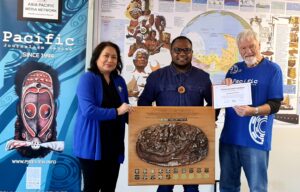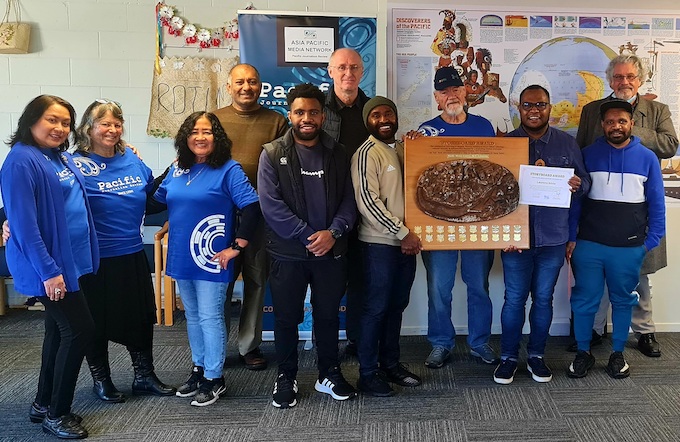Pacific Media Centre newsdesk
A new Asia Pacific social justice research and publication nonprofit has awarded a diversity communications trophy to a West Papuan postgraduate student who has advocated for the education and welfare of his fellow students.
Several dozen Papuan students trying to complete their studies were stranded in Aotearoa New Zealand by a sudden scholarship cancellation.
Laurens Ikinia, 26, has been campaigning since February for his fellow students to carry on with their studies in New Zealand after Jakarta scrapped their Papuan autonomy government scholarships.
However, while presenting the Storyboard Award for diversity journalism to Ikinia, interim chair of the Asia Pacific Media Network, Dr David Robie, said today the prize was primarily marking the work of the communication studies student during the pandemic in 2020 when he “raised the profile” of the tiny Papuan community in Aotearoa New Zealand with many articles.
“His efforts have gone on from strength to strength combining the skills of journalism and as a communications advocate,” he said at the ceremony in the Whānau Community Hub in Mt Roskill.
“Laurens Ikinia has done West Papua proud, and we’re also very proud of his work.”
The Storyboard Award was first created in 2006 with the first winner being Qiane Matata-Sipu, creator of Nuku: Stories of 100 Indigenous Women. Other winners have included John Pulu of Tagata Pasifika; Alex Perrottet, formerly of RNZ; Sri Krishnmurthi of Pacific Media Watch; and Alistar Kata and Blessen Tom of TVNZ’s Fair Go.
Publication of PJR
The APMN, formally founded earlier this month, was established to continue publication of Pacific Journalism Review, first launched at the University of Papua New Guinea in 1994 and published in recent years at the University of the South Pacific then Auckland University of Technology.
The network’s objectives also include providing resources to benefit “First Nations and other communities, and in support of fair representation for voiceless and diverse community interests”.
Gathered at the ceremony were academics, researchers, community advocates and journalists – including several stalwarts of the former Pacific Media Centre – and also “wantok” supporters of Ikinia.
A spokesperson for the Whānau Hub, Nik Naidu, said it was “exciting to be working with like-minded groups committed to social justice”.
“It certainly feels as if we are part of an important initiative — it’s a privilege to be part of such an inclusive and welcoming community,” said Dr Heather Devere, one of the network members.

Pacific Journalism Review editor Dr Philip Cass said it was encouraging that the 28-year-old journal now had a new home and his editorial team were busy working on the next edition due out next month.
Institutional support
Ikinia reported that for most of the 27 Papuan students who were impacted on by the loss of government scholarships and were still in Aotearoa they were being assisted by a mix of institutional support through accommodation and waiving of fees and public fundraising.
In the case of nine students in Palmerston North who had completed their carpentry course, they had been offered jobs and were applying for work visas.

Ikinia said that on behalf of the International Alliance of Papuan Students Association Overseas (IAPSAO) he was offering “our humble and sincere gratitude” for all the assistance provided in New Zealand.
He also said that student president Yan Wenda and secretary Christian Tabuni had returned to the Papuan capital Jayapura in a bid to seek government support.
“They’ve met Governor Lukas Enembe in person to talk about the struggle faced by all West Papuan students who are currently studying overseas,” he said.
It is believed the governor had issued instructions for the payment of outstanding fees.
Ikinia also thanked Auckland University of Technology for its support and community groups such as Pax Christi that have been fundraising.

This post was originally published on Asia Pacific Report.